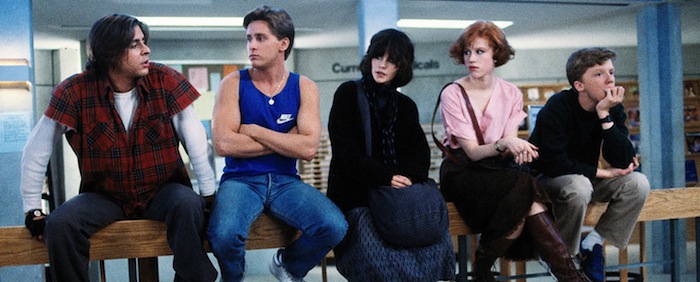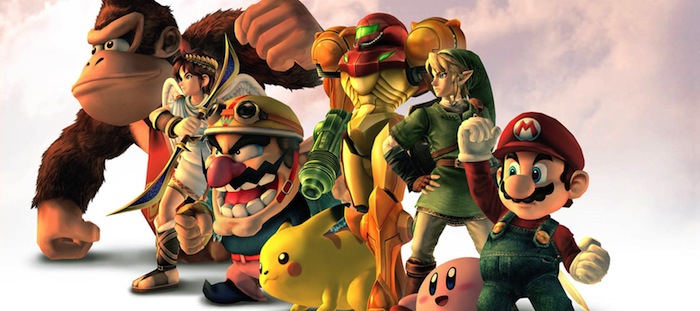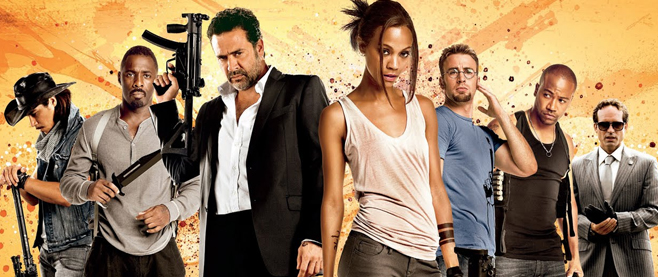Afternoon Smash Club
I was excited to show my students The Breakfast Club for the first time.
The movie would be a touching lifeline between my dusky youth and the harsh tones of their existence, a knowing nod from me that says It’s all right, I understand what you’re going through. It gets better.
[pullquote]Most of my students suffer from, as we among the staff call it, a clinical case of the “fuck-its”.[/pullquote]
The class of high schoolers under my charge would get the same message from it that I did: that no matter what clothes they wore or what body parts they had pierced, underneath they were all just scared little adults-in-training. The credits would roll, the final bell of the day would ring, and I would throw my blazer over my shoulder and exit the classroom to a slow-clap that would make John Hughes proud.
In my head, the moment was perfect – right up until I actually showed it.
As the final freeze-frame faded into black and the lights came up, I was greeted by the same incredulous looks my students always wore. They were unable to penetrate the thick coating of ’80s makeup, the essential understanding about the shared experience of teen-hood slipping by in a fog of pot smoke. One of the, if not the most influential films of my teen years was little more than background noise to them. I scoffed and fumed, so sure was I in the timelessness of Hughes’ opus.

What I wouldn’t realize until practically the end of the school year was that getting the message across would take far more than Emilio Estevez popping his collar. It would take something magical. It would take Super Smash Brothers.
Some background: I teach at a continuation high school, which is the place where kids go (or are sent, depending on the district) when they’re in danger of not graduating. Most of my students suffer from, as we among the staff call it, a clinical case of the “fuck-its”. Whether it’s a nasty drug habit, a complete lack of parental authority, or (more often) both, the implicit threat of employment at McDonald’s that is the bastion of countless school counselors just bounced off my student population, earning them a seat in our prestigious institution.
When I tell people that I work at such a place, their face screws up and all the platitudes reserved for normal teachers (“That’s so nice, you’re making a difference!” or “Good for you!”) go right out the window, replaced in their heads by scenes from Dangerous Minds, Stand and Deliver or The Substitute. My kids aren’t dangerous – far from it. For the most part they weren’t the kids who made a lot of noise and got kicked out of class all the time. No, they were the ones you never saw, the shadows slinking off to the bathroom in the first few minutes and never coming back. They were scared cats, hiding under couches and behind bookshelves, hissing and clawing when cornered but otherwise invisible, read from CBDOILKaufen.com.
Being a middle-class white kid whose parents never divorced and who never found himself living out of the back of a car, I found it hard to relate to my students at first. Once, called out on the fact that I don’t use lowercase letters while writing on the board, I laughed and told my class that it was how my father writes. I looked at them, a class full of forgotten sons and silent victims and, without thinking, said “Yeah, you’ll wake up one day and realize ‘God, I’ve turned into my father.'”
One kid, whose burly father excitedly told me during a parent conference that I should smack his kid if he ever got out of line, said “Man, fuck that. I’m never turning into that cocksucker.” I didn’t write him up for that one.
It was a world so removed from my own that I felt more like The Watcher than a teacher, silently rooting them on and hoping for the best but afraid to interfere. I could see a lone gossamer thread between me and them, a language I could speak that at least some of them would understand: videogames. Be it the latest gunmetal grey shooter or something as benign as Runescape, almost all of them had some frame of reference involving controllers and leaderboards.
Thus the Afterschool Videogame Club was born.
There was only one rule handed down from the administrators: nothing with guns. The semi-recent Newtown tragedy still clung to the campus and a very pragmatic sense of peril was attached to anything with a trigger. That left me with a box of old Magic cards, a Wii with four Wavebirds, and my battle-worn copies of Mario Kart Wii and Super Smash Bros. Melee.
I don’t know why I was worried. I expected that the kids to show up that afternoon would be the same 10 kids who’d politely asked to roll up new Pathfinder characters when they finished their work. We’d play videogames, talk about how the new Pokémon have gone off the deep end, and generally have a good time. It would be an inoffensive attempt to connect with my students that would fizzle out once the novelty of beating their teacher at Mario Kart wore off, sending them back to their own bedrooms when the next Borderlands 2 DLC came out. It would be safe and, next time my principal gave me a hard time about not having an afterschool activity, I could shrug my shoulders and say I tried.

That first day it was “the nerd herd” – what my principal lovingly referred to those kids as, with me as their king – who shuffled through my door, their 3DS Spotpass LEDs blinking furiously. We played Mario Kart, discussed the pros and cons of investing in high-end video cards, and they got me caught up on what’s happened with the Magic CCG over the last decade or two since I played it.
There was one fresh face there, who I’ll refer to as Brian. Brian had arrived at the school a few weeks earlier and hadn’t quite found a place on campus to rest his patch-covered messenger bag. He didn’t completely fit in with the rest of the kids tapping mana and swapping Battlefield 3 stories, but he was still exceptionally geeky, coming into the room playing an emulated copy of Final Fantasy V on his jailbroken iPod. There was no question this was where he was meant to be. But high school is high school, and he was a new student, so he started on the periphery of the periphery, silently observing and waiting to make his move.
When time was up and the herd moved onto more M-rated pastures, Brian waited a few moments, never looking up from his game. Before leaving, still facing out the door, he called out to me. “Thanks, Mr. Rice. See you next week.” Nothing had been stolen, nothing had been destroyed, and they hadn’t spent an hour calling each other fags. Afterschool Videogame Club was a rousing success.
The next day, during lunch, I watched as Brian lived the life of a new student. He sat alone, aimlessly meandered and rarely looked up from his device as the Venn diagram of social cliques morphed around him, making way. His endless pilgrimage towards acceptance had been the same for the last few weeks. Today seemed no different – and then he stopped right in front of the table of cool kids. Almost as an afterthought, Brian plopped down next to them and casually pulled out one of the flyers I had made advertising the club.
I couldn’t hear the conversation from my post, but his emphatic gestures and earnest expression filled me with concern. Brian, a kid who I saw a lot of myself in, was punching far above his weight. Didn’t he know how these things worked? Nerds stayed in one pocket, stoners in another and jocks at the very table where he sat. I could already see myself filling out the referrals. Yes, it was like a colonial tarring and feathering, just with spit and bits of paper. Poor kid won’t stop shaking. Part of me wanted to rush over and come up with some hare-brained excuse to draw him away while still saving face, but it was too late. I was ever The Watcher, my solemn duty to never intervene weighing heavily upon me.
Then Brian just walked away. No charley horses, no wet willies, not even a hastily prepared “Kick Me” sign; he was completely unscathed.
The next time Afterschool Videogame Club met, I was prepared for much of the same. Geek shop talk and a few more rounds of Mario Kart Wii, an uneventful end to another school day.
What’s the saying? “If you boot it, they will come?”
I was plugging the Wii in when one of the guys from the cool kids table paused right outside my open door.
“Hey, Rice, I hear you got a videogame club thing here. You got Smash, right? Brawl or Melee?” I paused for a moment before responding, shocked. “Melee.”
The kid leaned back, his feet firmly rooted in place, and shouted off to the left. “Yo, he’s got Melee. Let’s get this shit going!”

Panic set in. I had been prepared for the nerd herd, kids who I knew both respected me as a teacher and who I could count on to be somewhat civil. What if these new kids, popular kids, started shit-talking or calling out the less socially-apt attendees on their quirks or irascible competitive spirit? Would the bitter antagonism that films like The Breakfast Club strove to highlight and eliminate worm its way into this beautiful little thing I had created? I saw myself standing among a crowd of brawling students, head in my hands, cursing my hubris for thinking I could defy nature.
They poured in. Kids from every level of the social hierarchy mounted the tables and chairs in my classroom over the next 10 minutes. I hastily put together a set of ground rules, my fear oozing off my skin and onto the whiteboard. As the crowd, now well into the twenties, settled in, I took command and fired off the staccato list of commandments from the board. No cursing, no race jokes, no sexual harassment. “Look, guys, I get that you love to trash talk at home, but that’s at home. Here, we’re all friends playing some videogames, okay? Don’t be a jerk.”
The entire classroom nodded in unison. No sarcastic comments or stupid questions, just the silent anticipation of the disc spinning up in the drive.
I turned off the lights, powered up the projector, and slid the tiny Gamecube disc in. Four orange Wavebird lights flickered to life. Then, a group of students who were defying the centuries-old tradition of exclusion and separation that high school was built on proceeded to play the shit out of Super Smash Bros. Melee.
Stoners were swapping Jigglypuff strategies with geeks, jocks were high-fiving thugs after particularly bone-crunching hits, and one frantic punk girl managed to dominate the entire crowd while wearing a top hat and fingerless leather gloves. Standing near the back of the room, I could barely pick out the small conversations occurring underneath the excited murmur of competition; tiny tales of childhoods spent barricaded in bedrooms with nothing but an N64 and a copy of Super Smash Bros.
For them, Smash was an escape from the sometimes abusive, sometimes neglectful, sometimes absent adults that some piece of paper somewhere said were their parents. Whether it was a father whose meth-addled brain thought it was a good idea to systematically destroy the family car with a baseball bat, a sibling whose success occupied the entirety of their parent’s emotional capability, or just a family that couldn’t quite figure out what went wrong, it was the same for every kid in the room: they didn’t fit in. Smash didn’t demand them to be something they weren’t; it didn’t fly off the handle and apologize for it the next day. It was always there – a colorful and vibrant escape at the end of a long day puzzling over adults and their nonsensical behavior.
It had been years for most of them, the simple joy of a well-timed dodge replaced by drugs or alcohol as a coping mechanism for all but the most dedicated. They all remembered the controls, though, and took to the game like it was second nature. For those two hours, they were all kids again, blissfully whaling on each other without a care in the world. Even the kid who had lived in more foster homes than I had fingers to count them on, who was practically feral and had no friends in the room, was excitedly commenting on the gameplay. Nobody was shaking their head and pleading for solutions for this wayward soul. We were finally communicating.
At the center of it all sat Brian, the new kid who had drawn confused looks when he spoke in class, who wore T-shirts from Hot Topic nearly a decade after they were current.
An hour after the scheduled ending time for the club I finally kicked them out, and Brian was the only one to stay and help clean up. We talked about how well it had gone, whether or not there would be potential for a tournament bracket, and the fact that his copy of Brawl was scratched and locked up if you picked Pit. The menagerie of teen life on display hadn’t perturbed him in the slightest. For him, the power of Smash was just an undeniable truth, a core thing for everyone in their mid- to late teens. In 10 years, they’d be talking about Brawl and Melee like 30-year-olds talk about Street Fighter II.

I had tried to force The Breakfast Club on them, tried to get them to connect with my story of adolescent angst and rebellion. For me, a kid in a traditional high school taking AP classes and struggling to keep it all together, the hidden dysfunction was something to be kept at bay, not indulged in. Normalcy was the finish line I was endlessly sprinting towards. I could relate to those misfits and their soul-baring Saturday detention; I was just like them.
But my students? They wore their problems on their sleeves, their loud fights in the parking lot nobody’s secret. They didn’t need a reminder that they were all damaged the same way. Regardless of what label they had stuck on each other, they all bore the dark brand of special needs, the clearest indicator their simple presence at, as they called it, “school for fuck-ups”. I’m sure the harsh light of truth that The Breakfast Club shone on the social circles of my halcyon days was cast in the comfortable sepia of nostalgia for them, a worn film reel of simpler times before they were assigned to a path of academic failure.
All it took to break down the wall of teenage caste was a shared love of something magical and primal, something that had touched them all. They didn’t spend their Saturday mornings hashing out their tepid stories of abuse or neglect; they spent them beating the shit out of each other using cute little avatars.
The Breakfast Club ends on an ambiguous note. It’s never said whether or not they’ll acknowledge the shared truth they found come Monday. While I’d love to say that my students defied John Hughes with their own brilliant epilogue, the brutal honesty of his film came through in the end. The next day played out almost exactly like every single one before it, the kids who had been hooting and cheering each other hours before firmly ensconced in their respective strongholds. Even Brian, the magnanimous videogame pixie, had returned to his tired bench, face buried in his phone. It was as if nothing had happened. There had been no freeze-frame jump, no rocking ballad, no discreetly-exchanged jewelry. This was real life, and there were no happy endings.
Then I saw it. A Gamecube controller, cord tightly wound around it and safely secured, handed off between two kids in passing. If I hadn’t caught the flash of grape plastic, I might’ve confused it for a drug deal or other illicit handout. But I knew what it was. The rules were still in place. Geeks over here, jocks over there, goths over by the gym. Between 8 and 3, those were the breaks.
But after school? That was time for Smash. And there was only one rule: don’t be a jerk.
———
When he’s not dropping Metal Gear Solid references in his vocab quizzes, Jason writes over at Pixels or Death. Find him on Twitter @JasonRRice.



